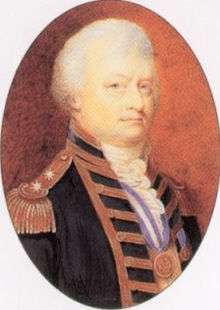Sir William Parker, 1st Baronet, of Harburn
Admiral Sir William Parker, 1st Baronet (1 January 1743 – 31 October 1802), was a British naval commander.
Sir William Parker, Bt | |
|---|---|
 Sir William Parker, 1st Baronet, of Harburn | |
| Born | 1 January 1743 Harburn,[1] Warwickshire |
| Died | 31 October 1802 (aged 59) |
| Allegiance | |
| Service/ | |
| Rank | Admiral |
| Commands held | Leeward Islands Station Jamaica Station North American Station |
| Battles/wars | American Revolutionary War |
Naval career
William Parker's father, Augustine Parker, had been mayor of Queenborough, Isle of Sheppey, Kent and a commander of one of the king's yachts.[2] William Parker entered the navy about 1756 and in 1758 was on HMS Centurion during the capture of Louisbourg in Canada and the capture of Quebec the following year.[2] He was promoted to lieutenant in 1762.[2] For a time he served off the coast of Newfoundland and was promoted to commander in 1763.[2] In 1777 he went to the West Indies where he served under Byron.[2] He served aboard various ships and as commodore and commander-in-chief on the Leeward Islands Station between 1787 and 1789.[2][3] During the 1790s he served under Admiral Lord Howe.[2] In 1794 he commanded HMS Audacious at the Battle of The Glorious First of June and was promoted to Rear-Admiral.[2]
After service on the Jamaica Station in 1796,[4] he took part under Sir John Jervis in the Battle of Cape St Vincent in 1797, where he damaged the 112-gun ship San Josef so badly that Commodore Horatio Nelson was able to board and capture her with little opposition.[2] The following year Parker, on blockade duty off Cadiz, bitterly resented that Nelson, junior to himself, was given an independent command in the Mediterranean, but his letters to the Admiralty had no effect.[2] He ended his career as Commander-in-Chief in North America at Halifax, Nova Scotia from 1800, and was recalled for disobeying orders.[2]
References
- The Parker and Edwards Families
- Sir William Parker at Oxford Dictionary of National Biography
- Haydn, Joseph (13 June 2008). The Book of Dignities: Containing Lists of the Official Personages of the British Empire ... from the Earliest Periods to the Present Time ... Together with the Sovereigns and Rulers of Europe, from the Foundation of Their Respective States; the Peerage of England and Great Britain Original 1851 Digitized by the University of Michigan. Longmans, Brown, Green, and Longmans. p. 279.
- Cundall, p. xx
Sources
- Cundall, Frank (1915). Historic Jamaica. West India Committee.
| Military offices | ||
|---|---|---|
| Preceded by Sir Richard Bickerton |
Commander-in-Chief, Leeward Islands Station 1787–1789 |
Succeeded by Sir John Laforey |
| Preceded by John Ford |
Commander-in-Chief, Jamaica Station 1796 |
Succeeded by Richard Rodney Bligh |
| Preceded by George Vandeput |
Commander-in-Chief, North American Station 1800–1802 |
Succeeded by Sir Andrew Mitchell |
| Baronetage of Great Britain | ||
| Preceded by New creation |
Baronet (of Harburn) 1797–1802 |
Succeeded by William George Parker |